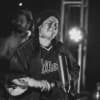Each Tuesday, FADER editor Matthew Schnipper highlights an underappreciated release he thinks we need to know about. This week it’s Thurston Moore’s 1995 solo album, Psychic Hearts. Listen to about five minutes of the album's great finale, "Elegy for All the Dead Rock Stars" on this French skating YouTube, buy the album and read Schnipper’s thoughts after the jump.
A few years ago, Thurston Moore wrote the introduction to a book about mixtapes. In it, he said that they used to make them and play off a boombox on the first Sonic Youth tours. In early ’80s downtown New York, that meant a lot of rap. He mentioned listening to Grandmaster DST, and said that the “DST” stood for Delancey Street. This is something I did not know. Today, on the subway to work, while passing the Delancey Street stop, I saw a woman doing her make up. Not just a touch up, either. She had a serious pad out, dabbing for many minutes, then a tiny jar with mauve cream to smudge over problem areas. It was intense how long she was at it. And I thought, as so many people must think so many times a day, Oh, what a different city! Thurston Moore lives in Massachusetts now.
He was already a father in 1995, when his first solo album, Psychic Hearts was released. In the lengthy thank you list, first—before Keiji Haino, Bikini Kill, Sofia Coppola, a one-named Spike Jonze, a lowercase mike watt—comes Kim G. and coco hayley, his wife (and Sonic Youth bandmate) and daughter. Along with Rita Ackermann’s cover and sleeve art, he included two photos of him as a child. In one, he’s wearing a tie with his school’s letters, standing beside a person in a bunny costume. The bunny’s looking at him and he’s looking at the camera. It could be menacing if you’d like. Mostly it looks sweet. The other photo is Moore between two little girls. The one two his right has her hands set against her thigh awkwardly, as if she does not know what to do with them for a photo. The girl to his left is clenching her eyes shut while still smiling. Moore’s got a dumb smile and a cocked head. He looks very natural.
The first thing you hear on Psychic Hearts is not music, but a voicemail from a schoolgirl calling Moore, asking if he’ll listen to her band’s new songs. Then the drums come in. About a minute after that, he says Hello fucker, meet your maker. It’s funny.
Almost three years ago, I saw Thurston Moore play in an Apple Store. His more record solo album, Trees Outside the Academy had just been released. He was promoting it. I’ve got the MP3s on my iTunes. He looks considerably younger on the back cover of this album, a soft shot, Thurston in a blue oxford with the button down collar unbuttoned. Most of Psychic Hearts also sounds considerably younger than Trees. The vinyl album is split in two. One LP is green and has songs one through 14. The other is black and one sided, with Rita Ackermann’s cat scrawl etching on the back. The other side is a 20-minute instrumental, “Elegy for All the Dead Rock Stars.” It’s the best song and the exact mental midpoint in his career. It’s almost the exact linear midpoint, too, but we can’t be exactly sure.
Songs one through 14 are really good, don’t get me wrong. Steve Shelley, Sonic Youth’s drummer, plays drums and he is remarkably reserved, a tempered musician who seems to be forever stalking his prey, content to never make rough contact. He’s all of the veins more than a backbone. There isn’t a backbone. Moore is the head and heart. But he’s in a small body here, or at least a monotonous one, as the tracks a somewhat samey, Moore’s sneaky sounding singing, his inimitable guitar churn occasionally touching sunshine, lotsa reference to pop culture ladies. Things vary, sure, but you’d be forgiven for forgetting which song is “Tranquilizer” and which is “Feathers.”
But “Elegy for all the Dead Rock Stars” is special. Moore kicks in the honey guitar, doubled by Tim Foljahn of Two Dollar Guitar. That is what it sounds like, relentless strumming from an alley cat Stratocaster, trying so earnest to get it to purr. With Shelley in the background, kicking up a magic cymbal sheen, the guitars don’t change for the first three and a half minutes, a little experiment in gentle patience. Over and over, translucent little waves crest and break until moon gravity begins to pull out and tease some high notes, some quake. Even then, though, the song returns to it’s gentle rolling down the hill. It’s not an avalanche if it’s not out of control, it’s just snow on a heavy journey. And then it breaks, Moore’s guitar finally drunk and belching noise, Shelley semi wilding on the cymbals, like someone put a gun to his head and forced him against his nature to play like a maniac. But before the most extended feedback swallows the song, it settles and recovers, the entire hullabaloo replaced with gentle strumming. Eureka, we’re back in pretty business. After a small moment of absolute quiet to bridge the mental gap, things regroup and tiny rainbows stem from the guitars anew. But here they’re energized, Shelley confident, Moore loud but not scary. It’s a finale full of glory and pride. It sounds like the key to something infinite and wise, the song being the tool, the catalyst and the knowledge for you to earn. It sounds like you could listen to it while getting a massage, after your grandfather dies, French kissing forging checks. Bad news, good news, something. It’s for a moment, but which one is of your choosing.
